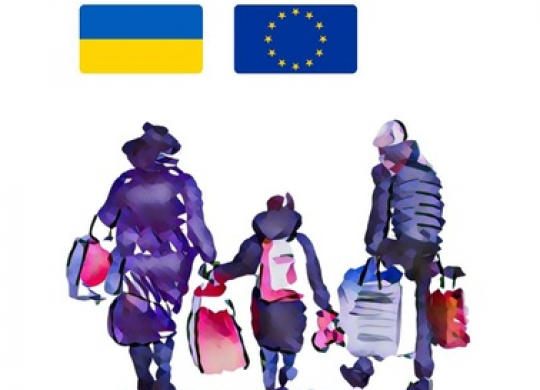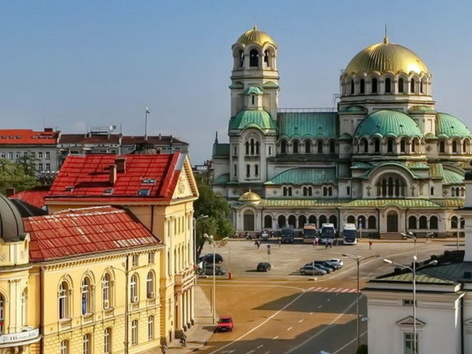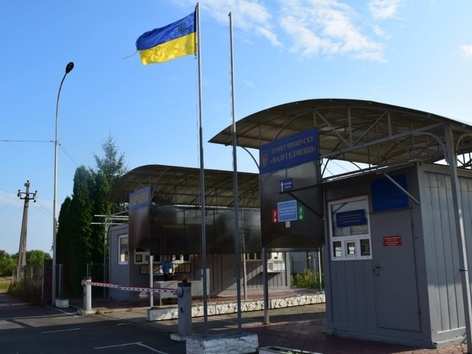
After leaving the country, Ukrainians face many issues that need to be addressed, including the legalization of residence and issuance of refugee status (international protection). It should be noted that in addition to the well-known refugee status, there is another relevant tool for Ukrainians - "temporary protection".
In general, people who left Ukraine on 24 February 2022 and later may receive temporary protection or refugee status in the EU. Temporary protection does not mean obtaining refugee status, however, persons who have received temporary protection in the EU can apply for refugee status at any time. So, what is the difference between refugee status and temporary protection and which of them is better for Ukrainians who have been forced to leave their homeland?
First of all, those who leave the territory of Ukraine should know that temporary protection and refugee status are different legal categories that have different legal consequences. People crossing the border are often confused in terms, mostly using the concepts of "refugee" and therefore, when applying for help, may misunderstand the category of protection they would like to receive in the EU.
The main document regulating the provision of temporary protection is the EU Directive 2001/55 / EU, which was activated by EU Council Decision 2022/382 of 04.03.2022 specifically for Ukrainians. Since the decision applies to all EU countries, Ukrainians can legally obtain the status of "temporary protection" in any EU country. Moreover, temporary protection is being activated for Ukrainians fleeing the war immediately after crossing the EU border. After registration with the relevant state authorities, citizens of Ukraine can immediately use the rights granted by the status: the right to work, medical care, education, access to housing, etc.
Who is eligible to obtain it? Citizens of Ukraine and members of their families displaced on 24 February 2022 and later have the right to obtain temporary protection, but each EU member state may, at its discretion, provide temporary protection to Ukrainian citizens who had been to the EU before 24 February 2022 for various reasons (on leave, for business trip, or fleeing from a possible war).
Validity period. The term of temporary protection is one year (until 04.03.2023) and can be automatically extended twice for six months if the reasons for granting such protection do not disappear, but up to a maximum of one year (until 04.03.2024). Depending on the situation, the European Commission may propose or extend the term for another year (until 04.03.2025). Therefore, temporary protection for Ukrainian citizens in the EU will be terminated once the war in Ukraine ends.
Procedure of obtaining. When crossing the border of an EU member state, a person must be informed by the public authorities of the country concerned regarding of his / her right to temporary protection. The process of obtaining such a status is quite fast and as simple as possible. In different EU countries, temporary protection issues are dealt with by different bodies (for example, the commune administration in Poland, the police in Italy, the Refugee Authority in Germany, and the Migration Service in Portugal).
Rights:
According to Directive 2001/55 / EU, a person receives:
- The right to reside in the country in which she sought temporary protection;
- Access to work, which can be obtained immediately from the moment of applying for protection;
- Access to housing (the state does not guarantee housing, but the competent authorities/volunteer organizations can help with its acquisition);
- Medical care;
- Social assistance;
- Access to education for children and adolescents;
The main international instruments governing the issue of refugees (international protection) are the Geneva Convention Relating to the Status of Refugees of 1951, the New York Protocol of 1967 and the Dublin Convention of 1990. The Dublin Convention of 1990, in turn, states that a person may apply for obtaining refugee status exclusively in the first safe country borders of which it has crossed. Given the closed air service over the territory of Ukraine, a person can apply for asylum only in those countries bordering Ukraine. If a person crosses the borders of several countries and seeks asylum in a country that does not border Ukraine, he/she will be deported to the state borders of which he/she crossed for the first time. A person's right to international protection is granted after a lengthy administrative procedure, which has its own peculiarities and can last from six months. During this time and after obtaining refugee status, a person seeking international protection faces certain restrictions.
Who is eligible to receive it? A person who: (1) has a well-founded fear of being persecuted on the grounds of race, religion, nationality or political opinion may apply for refugee status; (2) is outside the country of his or her nationality; (3) is unable or unwilling to enjoy the protection of their country.
Expiration date. Refugee status guarantees the right of permanent residence in the territory of the respective state. Refugee status can be revoked as soon as evidence emerges that there are grounds for reconsideration, but ending the war in Ukraine will not be an automatic reason for revoking it.
Receipt procedure. Obtaining refugee status involves a rather long administrative procedure (from 6 months), which begins with the application of a person for refugee status to the competent authority only of the state the border of which he/she first crossed. In each EU country, the application procedure has its own peculiarities, such as the withdrawal of an individual's passport before the end of the 6-month application period, the ban on employment during this period, the ban on leaving the country of residence, and compulsory residence in designated place (ban to rent an apartment or live with relatives), etc.
Rights:
Refugee status provides a very similar range of rights as temporary protection, but the main difference is that not all rights become available to a person who has crossed the border immediately from the moment of applying for refugee status. Thus, a person with the appropriate status is given:
- housing (usually a bed in a refugee centre);
- free meals
- medical care (limited);
- free travel on public transport;
However, the main feature of applying for refugee status is that a person cannot be employed for 6 months while his / her application for refugee status is being considered, even if he/she has previously lived and worked in this country.
Therefore, there is no doubt that if a person crossing the border intends to return to Ukraine after the end of hostilities, the best option for such a person is to obtain temporary protection, as the procedure itself is fast and the rights it guarantees are granted to the person immediately upon application. in contrast to the lengthy refugee status procedure.
When crossing the border of an EU Member State, the public authorities of the country concerned must inform the person of his / her right to temporary protection. The main thing is not to get confused in a hurry and panic, and instead of temporary protection not not ask for refugee status (unless of course, the person intends to obtain it)!!! For example, in Poland (which is currently the largest centre of our citizens), the application for refugee status is submitted through the border service. Therefore, there is a risk that when a person crosses the border, one can hastily ask not for temporary protection, but refugee status, which has its own, not quite "pleasant" features, in contrast to temporary protection.
Before deciding to apply for one of the statuses, remember:
1) Temporary protection can be obtained in any EU country (except Denmark), while refugee status can only be obtained in the country the border of which a person first crossed. That is, today they are Ukraine's neighbours.
2) Employment for persons who have applied for temporary protection is possible from the moment of applying, while for persons who have applied for refugee status, the option of employment within 6 months from the date of application is not available.
3) Persons who have received temporary protection may return to the state of citizenship at any time and travel within the EU for 90 days without hindrance. A person who has applied for refugee status is prohibited for 6 months while his / her application to cross the border of the host state is being considered.
4) When applying for refugee status, a person is forced to surrender his / her passport until a decision is made to obtain refugee status. In case of temporary protection, the passport is not revoked.
5) When you receive temporary protection, you are free to choose housing at your own discretion, especially now that there are a lot of volunteer organizations and resources in Europe that help to find housing for free. Instead, by applying for refugee status, you become hostage to the place you have been given in the refugee centre, which houses refugees not only from Ukraine but from all over the world.
To determine what status a person plans to receive in the host country, it is necessary to answer the question: what is the purpose of obtaining such status? If a person is interested in the immediate acquisition of all social rights and the urgent return to the territory of Ukraine after the end of hostilities and does not intend to remain in the EU, it is optimal to obtain temporary protection. If a person pursues more far-sighted goals, such as obtaining the right of permanent residence, then it makes sense to apply for refugee status. However, remember that if you plan to stay in the EU for a long time, regardless of the end of the war in Ukraine, you can choose other procedures for obtaining a residence permit in the EU without refugee status and without restricting your rights and comfort.
Recommended articles
1 min
Für Flüchtlinge



